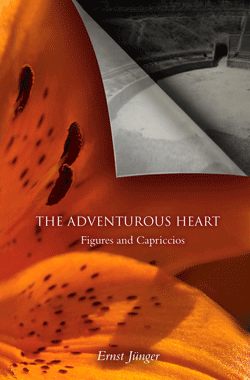Telos Press Publishing is pleased to announce the upcoming publication of Ernst Jünger’s The Adventurous Heart: Figures and Capriccios, now available for the first time in English translation. Pre-order your copy at the Telos Press website and save 10% off the cover price.

The Adventurous Heart: Figures and Capriccios
by Ernst Jünger
Translated by Thomas Friese
Edited by Russell A. Berman
With an introduction by Eliah Bures and Elliot Neaman
Release date: September 1
The 1938 version of Ernst Jünger’s The Adventurous Heart: Figures and Capriccios must be considered a key text in the famous German writer’s sprawling oeuvre. In this volume, which bears comparison to the Denkbilder of the Frankfurt School, Jünger assembles sixty-three short, often surrealistic prose pieces—accounts of dreams, nature observations, biographical vignettes, and critical reflections on culture and society—providing, as he puts it, “small models of another way of seeing things.” Here Jünger experiments with a new method of observation and thinking, uniting lucid and precise observation with the unconstrained receptivity of dreams. He calls this method stereoscopy, a form of perception by which our commonplace understanding is extended to include a simultaneous awareness of additional dimensions of sense or value in the object observed. But equally important to Jünger is an intuitive receptivity that comprehends matters directly at the midpoint of the matter, making laborious determinations of the periphery superfluous—intuition is a master key that opens all, and not just the individual doors of a house. With these methods, Jünger attempts to penetrate to the hidden harmony of things that lies behind the dualities of surface and depth, image and essence. This superb translation offers Anglophone readers a fresh look at one of twentieth-century Germany’s most extraordinary writers.
“This long-awaited translation of Ernst Jünger’s surrealistic threnody to aestheticized violence and the stimulation of the senses still has the power to unsettle and fascinate its readers. For rather than a straightforward paean to the heroic glories of war, The Adventurous Heart dwells in exorbitant detail on other horrors. No wonder it dashed the expectations of readers like Josef Goebbels, who revered the Jünger who had once extolled the intoxicating ‘front experience’ of the First World War.”
—Martin Jay, Sidney Hellman Ehrman Professor of History, University of California, Berkeley
“Not since Walter Benjamin’s One Way Street have we seen a book open such a panoramic window into the state of perceptions and experiences in Weimar Germany. The vignettes collected here show a comparable degree of compression, but Jünger reverses the direction in his intense glance to search along that other road, down a street lined by another set of addresses, where he looks for traces of a surviving eternity, a persistent nature, rather than intimations of revolution.”
—Marcus Bullock, author of The Violent Eye: Ernst Jünger’s Visions and Revisions on the European Right
“The Adventurous Heart is the last revolt of romanticism against the traditional world of normative laws and bourgeois beliefs. Jünger invents a strange somnambular landscape of terrifying events, daydreams, and allegoric scenes. His language produces different appearances of the fantastic or miraculous, which show significant similarities with early French surrealism. The dominating perspective is one of an aesthetics of sudden terror, shock, and suspicion, which finds its subversive or majestic symbolism.”
—Karl Heinz Bohrer, Professor Emeritus of Modern German Literary History, University of Bielefeld
“Among German writers of the twentieth century, Ernst Jünger holds a fascination that few can match. He was a remarkable witness of his time and place. This book offers a genuine service by making two of Jünger’s more fanciful pieces available in English translation.”
—Allan Mitchell, author of The Devil’s Captain: Ernst Jünger in Nazi Paris, 1941–1944



